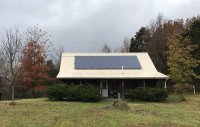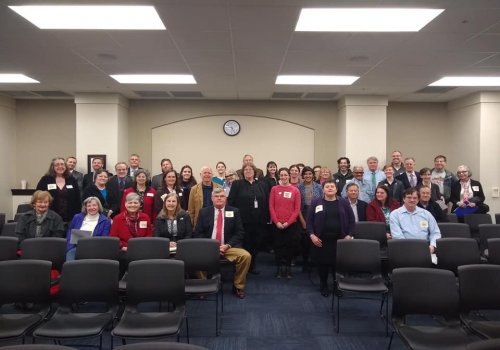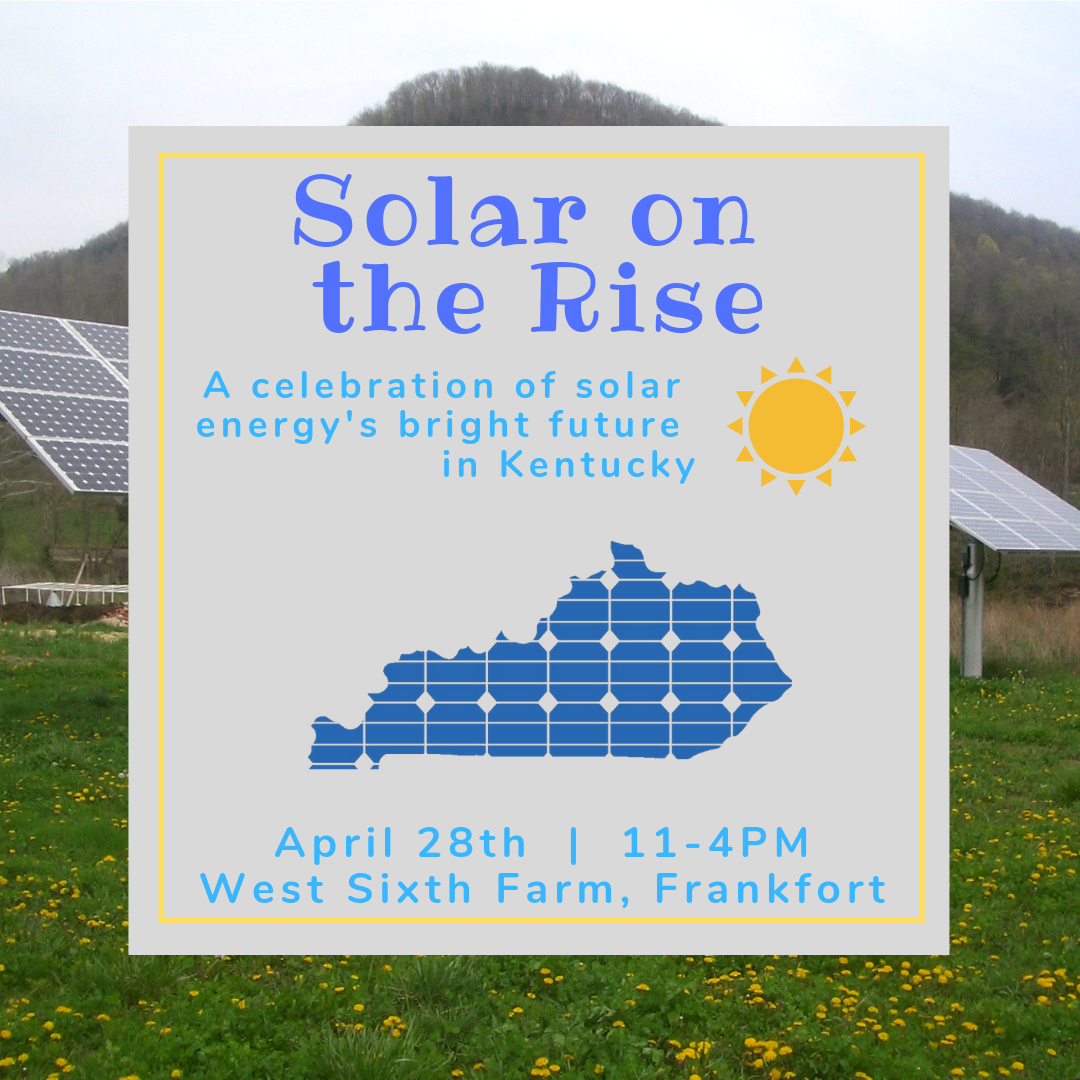Despite grassroots power, utility money sways legislators in the solar fight

Anyone who has followed the progress of Senate Bill 100, which attacked ordinary Kentuckians’ access to rooftop solar during the 2019 General Assembly, knows that this legislative session, monopoly utilities were determined to have their way.
That didn’t stop KFTC and 10 other ally groups from building a strong base of pro-solar advocates to fight the progress of SB 100, introduced by Sen. Brandon Smith, every step of the way.
SB 100, as passed by Kentucky legislators, re-writes the rules to favor monopoly utilities and restrict Kentuckians’ ability to choose where they get their energy. It does so by gutting an existing law, known as net metering, that gives qualifying solar customers in Kentucky a one-for-one credit for energy their rooftop systems provide to the grid. Net metering is the policy that makes rooftop solar accessible for most Kentuckians, and so attacks on net metering constitute attacks on rooftop solar and – by extension – Kentucky’s fledgling but fast-growing independent solar industry. Utilities, which do offer their own solar programs, think that by gutting net metering and eliminating rooftop solar in Kentucky, they can have a monopoly over the power of the sun.
The bill, which finally was passed at nearly 11 o’clock at night on the penultimate day of the session, was not the first time utilities have tried to restrict Kentuckians’ right to clean, affordable energy and a choice in where we get it. In fact, 2019 is the third year in a row that utilities have pushed such a bill – to the tune of $204,557 spent on utility lobbying in 2018, and $327,050 in PAC contributions to 2018 legislative candidates (90 percent of which were Republican candidates).
Monopoly utilities’ determination to push their latest attempt at an anti-solar bill through became apparent in the session, when party leadership railroaded the bill through the Senate Committee, Senate, and House Committee in less than one week – waiving procedural rules at every step of the way in order to do so. Public outcry and the concern of progressive lawmakers was enough to then stall the bill significantly in the House, however. The House added an amendment to SB 100, filed by Rep. DuPlessis, that – while imperfect – did make the bill much fairer to both current and potential solar customers. It was perhaps for this reason that the Senate struck the amendment down, and punted the bill back to the House.
 SB 100 then sat in the House for nearly a month, during which solar advocates and constituents continued to call, email, meet with legislators, and write letters to the editor and op-eds. It was during this month-long window that KFTC and others attended Solar Lobby Day in the capitol, and it was during this window that many KFTC members and allies chose to share their “solar stories” with the world. Member Amber Weygandt of Madison County shares: “I was able to meet with my representative regarding SB100, which was my first grassroots experience directly with a public official. Although he did not vote the way I had hoped, he did communicate with me throughout the session to answer my questions and explain why he was voting the way he was. [He noted] that more constituents had asked for a yes vote, which showed me it is just as important to talk with my neighbors about environmental issues as it is to call my representative.”
SB 100 then sat in the House for nearly a month, during which solar advocates and constituents continued to call, email, meet with legislators, and write letters to the editor and op-eds. It was during this month-long window that KFTC and others attended Solar Lobby Day in the capitol, and it was during this window that many KFTC members and allies chose to share their “solar stories” with the world. Member Amber Weygandt of Madison County shares: “I was able to meet with my representative regarding SB100, which was my first grassroots experience directly with a public official. Although he did not vote the way I had hoped, he did communicate with me throughout the session to answer my questions and explain why he was voting the way he was. [He noted] that more constituents had asked for a yes vote, which showed me it is just as important to talk with my neighbors about environmental issues as it is to call my representative.”
When the House finally voted, at night on the second-to-last day of the session, to remove their amendment and pass SB 100 unamended, many progressive legislators spoke to how betrayed they felt by the broken promise made my Speaker of the House David Osborne–to let the bill go forward only with improvements through the amendment or through conference committee. Others spoke of climate change or how this bill cripples the incredible potential for job growth that solar brings to Kentucky. And Rep. Cluster Howard observed during the floor debate: “The only people that contacted me about voting yes were lobbyists and public utilities. I don’t really trust either one of the groups very much. I got hundreds of emails against this from regular constituents.”
Utilities and broken political promises won out on the night of the House vote, but Rep. Howard’s words – as well as Rep. Stevenson’s during a committee meeting and the words of many other lawmakers throughout the session – confirms to us just how much power KFTC and allies built during the legislative session. To have at least four legislators talk about the impacts of climate change on the floor of the House marks a huge narrative shift for Kentucky politics. We are the reason this bill, which was intended to be railroaded through three weeks ago, stalled for so long. We are also the reason the bill failed the two previous years and why utilities worked so hard to ram it through this year.
What’s next? While solar may become more out of reach for many Kentuckians starting in 2020, members locally and across the state are working on initiatives for households to band together and bulk-buy their solar panels at a discount rate – and are determined to get as many folks signed up before the law takes effect at the end of the year. Here are two opportunitites to take part in some of these efforts:
- The Solarize Lexington Initiative is open to homeowners, small-business owners and non-profits who want to learn how to go solar what it would cost. This an exclusive opportunity for a streamlined solar installation process and a discount if you sign up during the outreach program. You can fill out the form at www.solarkentucky.org to learn more or attend a Solarize event. It’s completely free to register and there is no obligation to buy. The Solarize Lexington initiative has negotiated a 15% discount with Solar Energy Solutions, a local solar installer, to provide full installation. Solar net metering is still possible through the end of 2019 under current statute, and would come with being grandfathered into that program. Not to mention it’s the last year for the 30% tax incentive, so now is the best time to go solar! Learn more by visiting our website.
- The Solar United Neighbors Eastern Kentucky Solar Co-op is open for new participants. Join together in eastern Kentucky to save money though the power of bulk purchasing with the help of non-profit Solar United Neighbors. There is no cost to join, and no obligation until you sign a contract with the community's selected installer. Nearly 200 community solar co-ops have helped 3,600 families go solar though this program including half the installs in WV. Learn more and sign up at www.SolarUnitedNeighbors.org/EKY.
The network of solar allies is also determined to stay strong in promoting solar stories and reinforcing the narrative that solar works in Kentucky. They will be hosting a solar celebration event on April 28 at West Sixth Farm in Frankfort to lift up this narrative. KFTC members will also be taking to front porches, events, and candidate forums to register, educate and mobilize as many voters as it takes to get a legislature that will place their constituents’ wishes over those of Kentucky’s monopoly utilities. We know that we have the power already – and this year, we’re going to make to sure we use it.

Recent News
Kentucky’s past legislative session showed alarming trend toward government secrecy
Churchill Downs takes more than it gives. That's why the Kentucky Derby is a no-go for me
‘We must never forget.’ Kentucky town installs markers for lynching victims.
Featured Posts
TJC Rolling Out The Vote Tour – a KFTC Reflection Essay
KFTC Voter Empowerment Contractor Reflection Essay
Voting is Power
Archives
- Home
- |
- Sitemap
- |
- Get Involved
- |
- Privacy Policy
- |
- Press
- |
- About
- |
- Bill Tracker
- |
- Contact
- |
- Links
- |
- RSS

